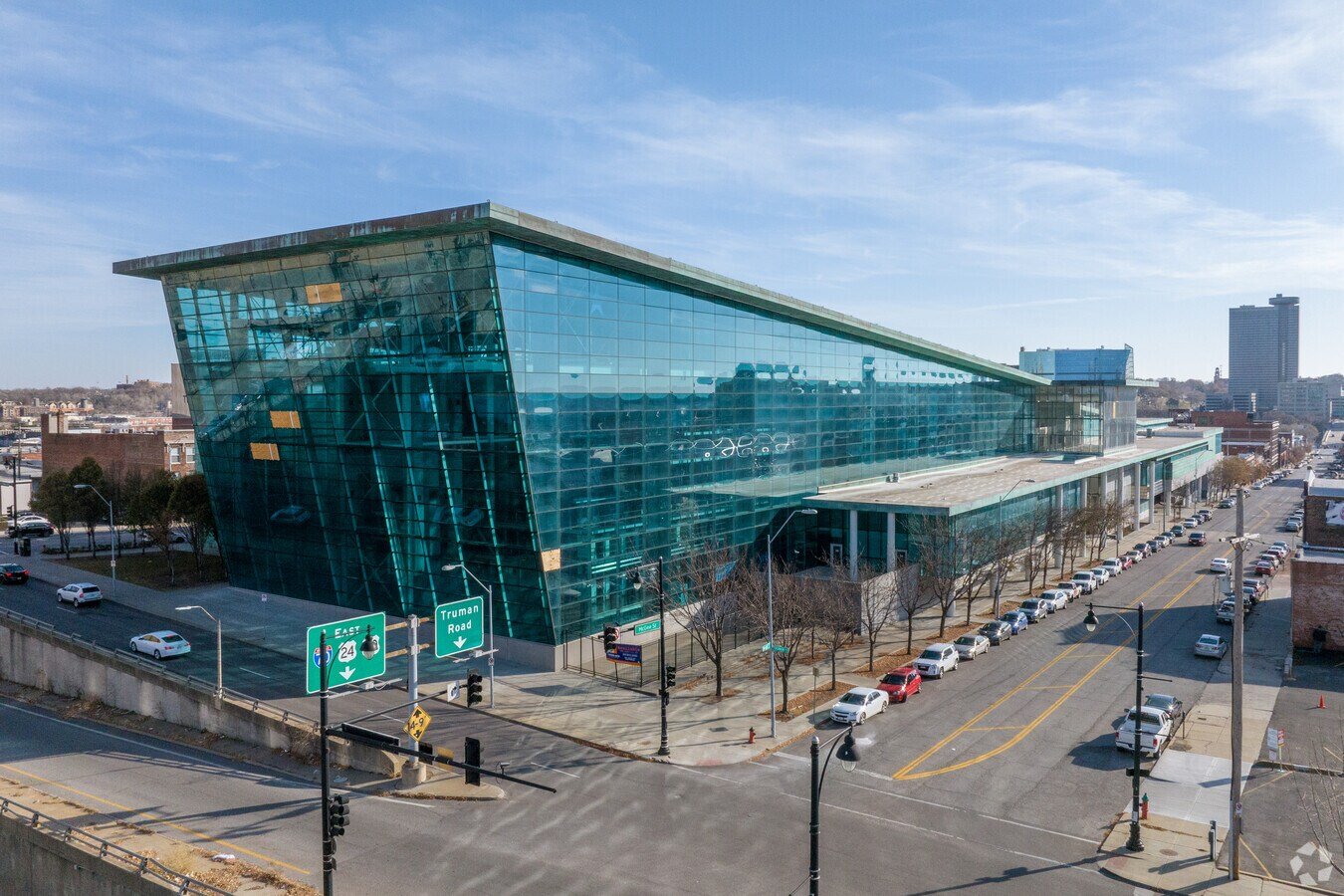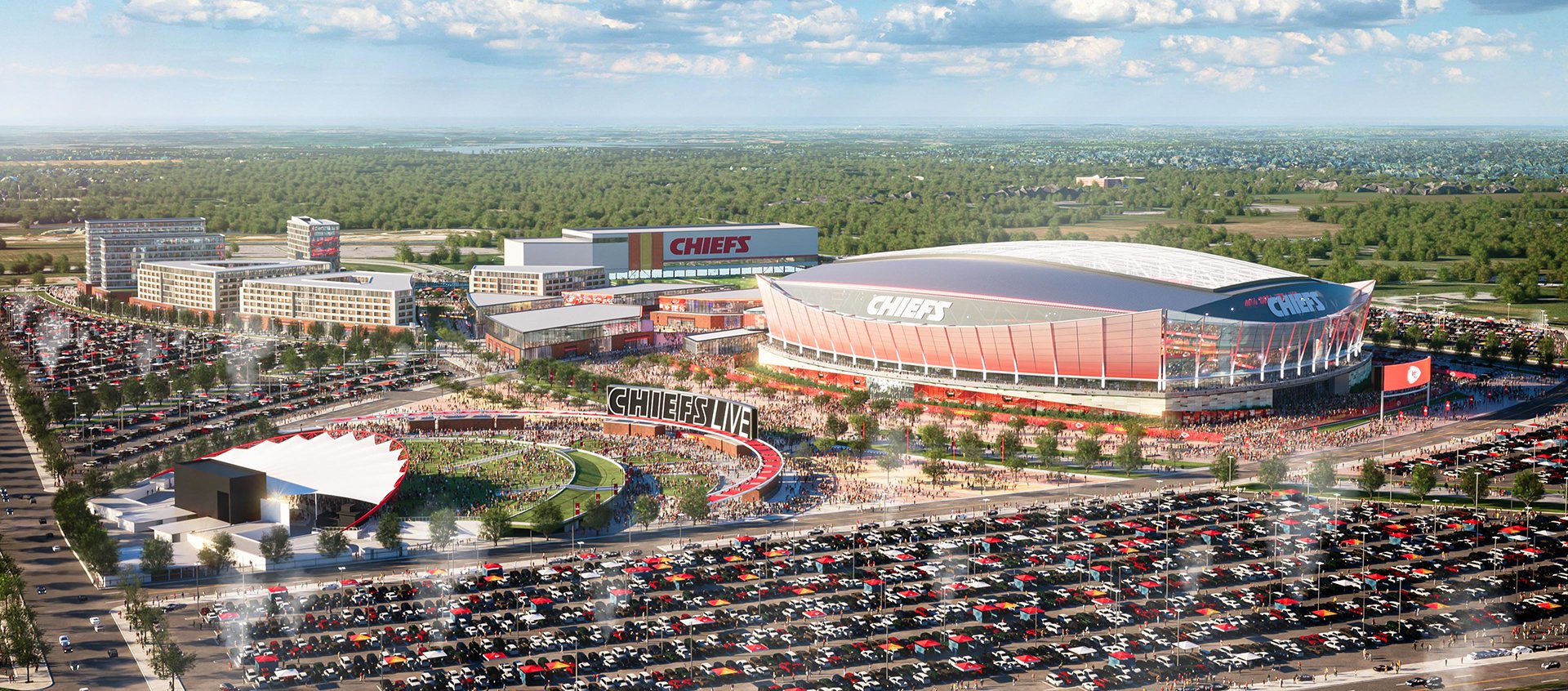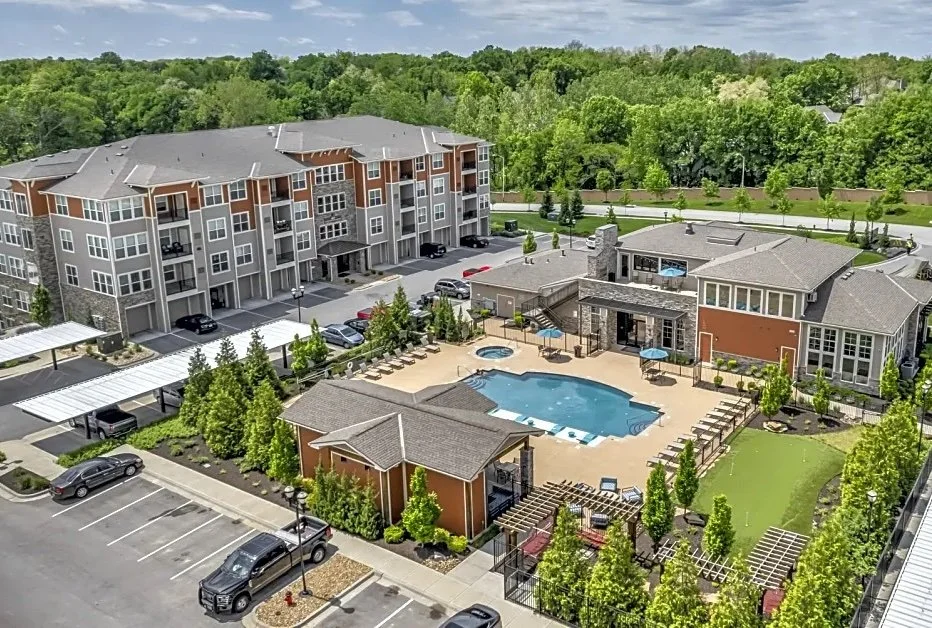Header image: Altitude 970, strategically located near the Kansas City International Airport and KCI 29 Logistics Park, is an example of the premier luxury apartment communities sprouting up around Kansas City to support the growing demand. Photo credit: BAM Capital
Regnier Family Wonderscope Children's Museum adds final touches, opens today
Final touches are complete on the new, $15 million Reigner Family Wonderscope Children's Museum, which is set to open today at 433 East Red Bridge Road in Kansas City, Mo.
Kansas City’s newest 30,000-SF children’s museum features ten dynamic exhibit spaces focusing on STEAM (science, technology, engineering, arts and math) activities, birthday party rooms, classroom spaces and a half-acre of outdoor educational fun.
Western Specialty Contractors’ Great Plains Roofing and Sheet Metal Branch of Kansas City, Kan. installed the “cherry on top” of the eye-catching building, which included the colorful, metal wall panels above the museum’s exterior entrance, along with Thermoplastic Polyolefin (TPO) roofing.
A crew of six workers installed the .125 aluminum plate wall system, manufactured by Northclad, which consisted of 210 brightly colored, angled panels that averaged 7 feet tall with widths ranging from 2 inches to 6 feet. Western used a series of subgirts to attach the metal panels to the building’s façade and also installed 800 SF of Firestone fully-adhered TPO roofing over the top of the panel area. The installation was completed in twenty days.
Western branch manager Rod O’Bannon said installing the panels in the complex pattern, which were designed by the Dimensional Innovations, posed the greatest challenge on the project.
“The museum will be recognizable by its unique façade, so we had to make sure we had it right. Each panel had custom angles, so aligning them correctly with equal spacing was a challenge, but our experienced crew did an outstanding job,” said O’Bannon.
General contractor, McCownGordon Construction began construction on the musuem in March 2018. Other project partners included Haizlip Studio, MIG Portico, Paul Orselli Workshop and CBRE.
For the past 30 years, the museum has resided in the former Flint Elementary School building in Shawnee, Kan.
Read previous, related MWM story here from June 2020: Construction progressing at Wonderscope Children's Museum
KC's industrial, transportation, logistics shine through stormy 2020
During what has been a stormy 2020, even hurricane-like for some, Kansas City's economy continues to shine brightly, beaming light of even more sunny days ahead.
“From a transportation, supply chain, logistics, industrial, whatever word you want to use, Kansas City is on fire,” said Chris Gutierrez, president of KC SmartPort and moderator of a webinar panel discussion organized by the Mid-America Region of the Design-Build Institute of America (DBIA-MAR) and hosted by McCownGordon Construction on October 14, 2020.
Gutierrez’ remarks preceded his introduction of the panelists: Eric Goodman, regional manager economic development at BNSF Railway, Andy Kyser, marketing manager at UPS, David Long, deputy director of Aviation - Properties & Commercial Development at Kansas City Aviation Department and Jon Stephens, president and CEO at Port KC.
The panelists discussed the activities of their respective organizations and the implications for Kansas City, the effect of COVID on each organization and outlooks for the future.
Goodman said the big focus for BNSF in Kansas City is its development at Logistics Park Kansas City (LPKC) where BNSF’s facility opened in 2013.
“Since then, we’ve had 17 million SF of development pop up around there. That’s going to be our anchor, our footprint here for intermodal for the next 50 years,” Goodman said.
“The part of our business that’s doing really well for us right now is our intermodal business, both domestic and international. We had a dip in that volume back in March, into April and into a little bit of May, but that volume has been going absolutely gangbusters ever since that date,” said Goodman.
Goodman said he recently read a statistic that every single stored intermodal car that BNSF had in its network was back in service. At one point, BNSF had parked approximately 2,000 locomotives.
“Business is definitely back. We’re definitely seeing that there’s a lot of interest in intermodal growth coming off the west coast ports and domestic volume coming into Kansas City,” he said.
According to Kyser, UPS views the Kansas City region as an integral part of its overall strategy.
“Our mission is to be better not bigger and to really do that by being customer first, people led and innovation driven. That’s where Kansas City fits in, both on the people led and the innovation driven standpoint,” said Kyser.
Kyser noted that UPS has made significant investments in its facilities at the airport and in Lenexa, Kan. UPS recently expanded its facility in Lenexa from 226,000 SF to 430,000 SF.
“During our peak day, we used to be able to process about 1 million pieces throughout a day; that’s going to ramp up to be almost 2 million based on the infrastructure we’ve built here at the Lenexa facility. There’s miles and miles of conveyor throughout the facility. The crazy thing is that it only takes about 20 seconds from a package to get unloaded until it’s getting loaded on the outbound,” said Kyser.
Kyser said UPS is investing nearly $21 million to expand its facility at KCI.
“We’re adding about 370,000 SF- for a total of 534,000 SF- which gives us five additional parking spots as well as remodeling the facility that we have there to take the flow per hour, the capacity from 1500 pieces an hour up to 5000,” Kyser said.
Kyser said that the pandemic has not slowed UPS’ business. UPS hired 50,000 employees during the second quarter as permanent hires, just to handle the 55% increase in business fueled by the burgeoning e-commerce market.
“We’ve had to staff up and get our operations in a position to be prepared not only to handle what we view as a permanent shift, an acceleration of e-commerce activity of almost 5 to 6 years, but also our peak season, so we’re hiring 100,000 temporaries across our network during peak to be able to handle all that volume,” Kyser said.
Although growth at KCI was down this past year between 50-60% from 2019 numbers, Long said he’s seeing a steady rebound.
“In fact, Monday [October 12] was the most folks that had gone through our security screening checkpoints since the middle of March, and that is a better percentage than the country overall,” Long said.
The pandemic hasn’t slowed the construction of the new KCI terminal, and the airlines remain committed to the 39-gate overall facility, Long said.
“We are on time and on budget for this project. About 85% of the $1.5 billion is actually 100% procured so when I say on time, on budget, we know that’s exactly what it’s going to cost us. On time means March 3, 2023,” said Long.
Although Aviation Department officials were worried that there would be delays in the supply chain during the pandemic, “everything has been coming exactly the way that it needed to come,” Long said.
Long said that COVID-related measures were enacted to keep workers on the construction site safe, including adding additional bathrooms, staggering start and stop times, adding wash stations and providing hard hats with sensors that blink and make an audible sound when workers are within six feet of each other. Although there have been as many as 1000 employees on the work site, only seven have tested positive for the virus.
Long noted that the project has employed 100 minority and women owned businesses which accounted for a little more than $170 million.
“Having that kind of income into the minority community on that business is just a big shot of adrenaline into the arm, and those are all local folks that will be better skilled, better able to handle the many jobs that will happen in the future,” said Long.
Stephens describes Port KC as “a redevelopment entity and a reclamation entity that really focuses on under-utilized, under positioned places and brings them back to life with private sector partners and sometimes with public sectors.”
In 2015, Port KC brought back to life the Woodswether Terminal in the West Bottoms, which Stephens described as one of the most unnoticed small bulk goods terminal ports in the area.
“We’ve put about $22 million into that facility and we’ve doubled the tonnage every year since 2015. In 2019, we went over 100,000 tons transferred through that facility,” said Stephens.
Stephens also highlighted the redevelopment of the Berkley Riverfront where Port Kansas City continues to see growth in reclaiming the area.
Stephens noted Port KC has seen “incredible growth” at the site of the former Richards-Gebaur Air Force Base. Port KC recently rebranded the approximately 2600 total acres as 49 Crossing.
“We’re seeing significant job growth down there. That’s one of our goals,” said Stephens.
And, Port KC recently won a MARAD grant of nearly $10 million from the U.S. Department of Transportation’s Maritime Administration to create the Missouri River Terminal at the former site of AK Steel in the Blue River corridor near Sugar Creek and Independence, Mo.
“We will be working to bring 420 acres back to life with all the Class 1 rail coming through that site. We’re excited to have the MRT facility with will become North America’s first comprehensive transloading facility that combines rail, trucking and water borne commerce,” said Stephens.
Stephens said that a lot of economic development and reclamation is related to hotels and retail, and Kansas City has seen approximately a 75% drop in those sectors during the pandemic.
“On the positive side, multifamily rental units are up 50% year over year, in projects, in total units and total volume for us, 2020 over 2019,” Stephens said.
“We’ve seen a one-third growth in 2020 thus far as of October 1 in logistics and distribution and ecommerce. We may even go higher than that. In total dollars, jobs and acreage, we’re at about a 65% increase in 2020 so far,” said Stephens.
Gutierrez said he projects that in 2020, build to suit for clients or spec development will exceed 15 million sf.
“That’s a record for this market. And everything I’m hearing is that 2021 is going to be even greater,” said Gutierrez.
“It’s an exciting time to be in the industrial, transportation, supply chain space, especially in Kansas City. We are the center of everything that’s happening with supply chain and transportation growth and we’re going to hit records on industrial development and industrial construction this year and forecast an even better year next year,” said Gutierrez.
Colorado construction company returns to roots
Colorado-founded GE Johnson Construction Company is establishing a presence in the Kansas City metro and bringing it back to where it all began.
The relationship-focused construction company is currently building out their new office in Lenexa, Kan. and hopes to begin occupying the space by the end of September.
The Kansas City office is being led by Derek Cox. who recently joined GE Johnson with more than 17 years of industry experience and extensive knowledge of the local market.
“What is fascinating about GE Johnson, a Colorado firm, is that it has roots in Kansas, where founder Gil Johnson and his son, current president and CEO Jim Johnson, were born. The culture at GE Johnson is built on ingenuity and relationships; we truly care about our employees, clients, and community. GE Johnson is a perfect fit for the Kansas City region, and I am excited to lead our efforts here,” said Cox.
In addition to their Kansas roots, both Gil and Jim Johnson are K-State graduates.
The company, who focuses on advanced technology, higher education, mixed-use and government & civic projects, is jumping in with both feet on notable, local project Advent Health South. Located at 165th and Antioch in the Bluhawk development in Overland Park, Kan., the $150 million hospital expansion is slated for completion in late 2021.
The team also recently added Kathleen Ismert Allen as a business development manager. Since starting the Kansas City office in October 2019, the local group has grown to a staff of fifteen.
Other GE Johnson locations include their headquarters in Colorado Springs, Colo.; and offices in Denver and Vail, Colo., Jackson, Wyo. and Oklahoma City, Okla.
Industrial market flying smoothly through 2020 turbulence
Despite the economic turbulence COVID-19 has unleashed on 2020, the industrial real estate market seems to have buckled in for a relatively smooth ride, according to a recent CCIM KC panel.
Brent Miles, chief marketing officer and founding partner of NorthPoint Development and Joe Orscheim, SIOR, CCIM, senior vice president of CBRE, joined moderator Ben Boyd, CCIM Kansas City director of programs and vice president of Colliers International, for a webinar discussion last Friday about the state of the industrial market.
Both Miles and Orschein agreed that e-commerce is the major driver strengthening the industrial market as online shopping has exploded during the pandemic. Miles noted that increased demand for industrial space for companies like Amazon and Chewy is COVID-related, but he thinks the expansion represents a permanent change.
“They are the infrastructure and the plumbing of how we’re getting goods,” Miles said.
According to Miles, NorthPoint Development, which owns approximately 75 million square feet of industrial properties across the United States, saw only about 5 percent of its clients request and receive rent relief.
Orschein said he anticipated more requests from tenants for rent abatement than actually were made. Landlords, he said, used the requests as an opportunity to obtain updated financials, and in some instances, to extend the lease term by the number of months they abated rent.
“It was good for both parties. It’s always good for a landlord to show that they’re looking out for their customer and obviously they want them to be financially strong so the project remains successful,” Orschein said.
Miles said that availability of labor remains a concern in the industrial market, with uncertainty about how future stimulus or bailout legislation will affect unemployment and labor.
Orschein noted that there is a challenge to find “really good tracts that are ready to go” in the Kansas City area in order to satisfy demand. “We’re getting weekly calls from out of town developers and capital sources that are looking to land here in Kansas City, and we just need more land. We’ve got to figure it out. There’s strong demand, and we’re not seeing any kind of a slowdown so we’re encouraging everyone to just keep putting them up and we’ll all fill them,” said Orschein.
Orschein also noted that rental rates in the Kansas City industrial market are “pretty steady and level” and that he is seeing lower cap rates. He anticipates that the local industrial market will see one or two big institutional players enter by the end of the year.
“Everybody is taking note of Kansas City,” Orschein said.
According to Orschein, there is strong demand for industrial space for the food industry; however, the challenge is to figure out food requirements and freezer cooler needs.
“It’s obviously very expensive and highly specialized, but the need is there. We’ve just got to figure it out in Kansas City. In the industrial world, it seems like after the first couple of weeks of COVID hitting, it’s like everybody just got on the same page and said let’s all get back to work and keep the train moving,” Orschein said.






